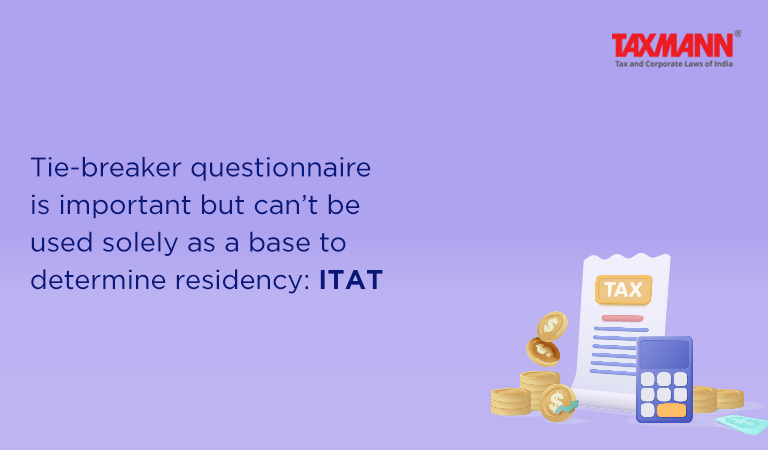Tie-breaker questionnaire is important but can’t be used solely as a base to determine residency: ITAT
- Blog|News|International Tax|
- 2 Min Read
- By Taxmann
- |
- Last Updated on 11 January, 2023

Case Details: Sameer Malhotra v. ACIT - [2023] 146 taxmann.com 158 (Delhi-Trib.)
Judiciary and Counsel Details
-
- N.K. Choudhry, Judicial Member & Anil Chaturvedi, Accountant Member
- Siddhesh Chaugule, Ld. Adv. & Ajit Jain, Ld. C.A. for the Appellant.
- Sanjay Kumar, Ld. Sr. DR for the Respondent.
Facts of the Case
The assessee relocated to Singapore along with his family members from 6th December 2014 onwards and became a resident of Singapore for the calendar year 2014-15. He also qualified as a resident and ordinary resident of India as per section 6(6) for the Financial Year 2014-15 in India.
Since he qualified as a resident of both India and Singapore, residency was required to be determined as per Article 4(2) of the Treaty.
The Assessing Officer (AO) held that as the assessee had a permanent home in India therefore as per the tie-breaker questionnaire, the assessee was a resident of India for Global Taxation purposes and for the purpose of provisions of India-Singapore DTAA.
The controversy involved in the instant case was related to the income earned by the assessee in Singapore from 15th December 2014 to 31st March 2015. Whether the assessee was liable to be taxed in India qua the income earned during that period in Singapore?
ITAT Held
The Delhi Tribunal held that no doubt the tie-breaker questionnaire has importance in determining the residency of a person, but the same cannot be exclusively taken into consideration as a base for deciding the residency.
The permanence of a home can be determined on a qualitative and quantitative basis. There is no dispute that the assessee reported income and paid taxes in Singapore. Therefore, according to the Treaty, they cannot be taxed in India to prevent double taxation
As per clause (a) of Article 4(2) of the Treaty, a person shall be deemed to be a resident of the State in which he has a permanent home available to him. If a permanent home is available in both states, the person is considered a resident of the state with stronger personal and economic ties (center of vital interests).
The AO, using the tie-breaker questionnaire, found that the assessee’s center of vital interest was in India, not Singapore, as most of their savings, investments and personal bank accounts are in India.
However, it was a fact that the assessee had worked in Singapore during the period under consideration and stayed therein only. Therefore, his personal and economic relations (Centre of vital interests) at that particular time in Singapore cannot be brushed aside, as the assessee went to Singapore along with his family for earning income.
Additionally, according to Article 4(2)(b), habitual residence can also be taken into account when determining a person’s residency. Habitual residence is not the same as a permanent residence, but rather refers to the place where one normally lives. During the relevant time frame, the assessee lived in Singapore and had a habitual residence there. Therefore, based on this, the assessee can be considered a resident of Singapore.
Hence, AO, on basis of the tie-breaker questionnaire as per article 4 of India-Singapore DTAA, had erred in holding that assessee was actually a resident of India for purpose of taxation of global income.
Disclaimer: The content/information published on the website is only for general information of the user and shall not be construed as legal advice. While the Taxmann has exercised reasonable efforts to ensure the veracity of information/content published, Taxmann shall be under no liability in any manner whatsoever for incorrect information, if any.

Taxmann Publications has a dedicated in-house Research & Editorial Team. This team consists of a team of Chartered Accountants, Company Secretaries, and Lawyers. This team works under the guidance and supervision of editor-in-chief Mr Rakesh Bhargava.
The Research and Editorial Team is responsible for developing reliable and accurate content for the readers. The team follows the six-sigma approach to achieve the benchmark of zero error in its publications and research platforms. The team ensures that the following publication guidelines are thoroughly followed while developing the content:
- The statutory material is obtained only from the authorized and reliable sources
- All the latest developments in the judicial and legislative fields are covered
- Prepare the analytical write-ups on current, controversial, and important issues to help the readers to understand the concept and its implications
- Every content published by Taxmann is complete, accurate and lucid
- All evidence-based statements are supported with proper reference to Section, Circular No., Notification No. or citations
- The golden rules of grammar, style and consistency are thoroughly followed
- Font and size that’s easy to read and remain consistent across all imprint and digital publications are applied



 CA | CS | CMA
CA | CS | CMA
